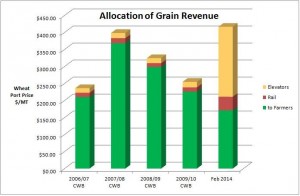(December 23, 2015) Among many important things, the holiday season is a time for good cheer and general amusement. So with that in mind, readers, especially prairie grain farmers, may find this breathless BBC report of a “mega” Australian grain train pulling a whole 73 cars of wheat grown near Narrabri, New South Wales to the coastal port of Newcastle amusing – not the least for its “gee whiz – ain’t those Aussies amazing” tone.
A friend of mine who raises wheat near Regina laughed and said “I see five or six trains a day past my place that are easily twice that long.” A reminder that western Canada lives or dies by its grains and trains.
But the BBC report is sobering as well. That Aussie train was carrying wheat competing with our prairie wheat for the lucrative Asian market. However it was heading downhill over flattish terrain for a mere 400 km to deep water. Compare that with our own grain moving almost 1,800 km from Regina to deep water at Vancouver. In contrast to permanently temperate New South Wales in Australia, western Canadian sourced grain has to cross the prairies, where occasionally temperatures can be bracing, then climb over and through seven mountain ranges to Vancouver.
There are less than 300 nautical miles difference between Vancouver and Newcastle, Australia to Kobe, Japan, so the critical difference in transportation costs comes down to the huge difference in shipping by rail to deep water between the prairies and Australia’s wheat growing area.
This extra distance is a cost disadvantage, and now provides the private trade with an excuse to pay lower prices to prairie farmers. When prairie farmers owned and marketed wheat through the single-desk Canadian Wheat Board, this disadvantage of distance was more than compensated for because the Wheat Board carved out an international niche market based on the reliable supply of high-quality grain direct to end-use customers who paid premium prices which the Wheat Board passed back to prairie farmers.
Prairie grain is no longer owned by prairie farmers thanks to the end of the single-desk Wheat Board. That grain is now owned by the same giant companies that own Australian wheat and premium prices for western Canadian farmers are long gone. So when it comes to making money “who ya gonna call” if you are one of the ABCD group of companies and you own and effectively control all the tradable grain on the planet?
The answer to that is pretty clear. The ABCD group of companies are perfectly happy to take western Canadian grain off the hands of farmers, but at a much greater discount than ever before simply because they now can. As predicted by both the former Wheat Board and its many supporters, western Canada is becoming a residual supplier of wheat to the world market and that is reflected in our smaller share of the world price.
 So in the spirit of Charismas we can only recommend reading The Ritz who killed the Wheat Board to your farmer colleagues, especially those in dairy, since grain farmers already know how it comes out.
So in the spirit of Charismas we can only recommend reading The Ritz who killed the Wheat Board to your farmer colleagues, especially those in dairy, since grain farmers already know how it comes out.



